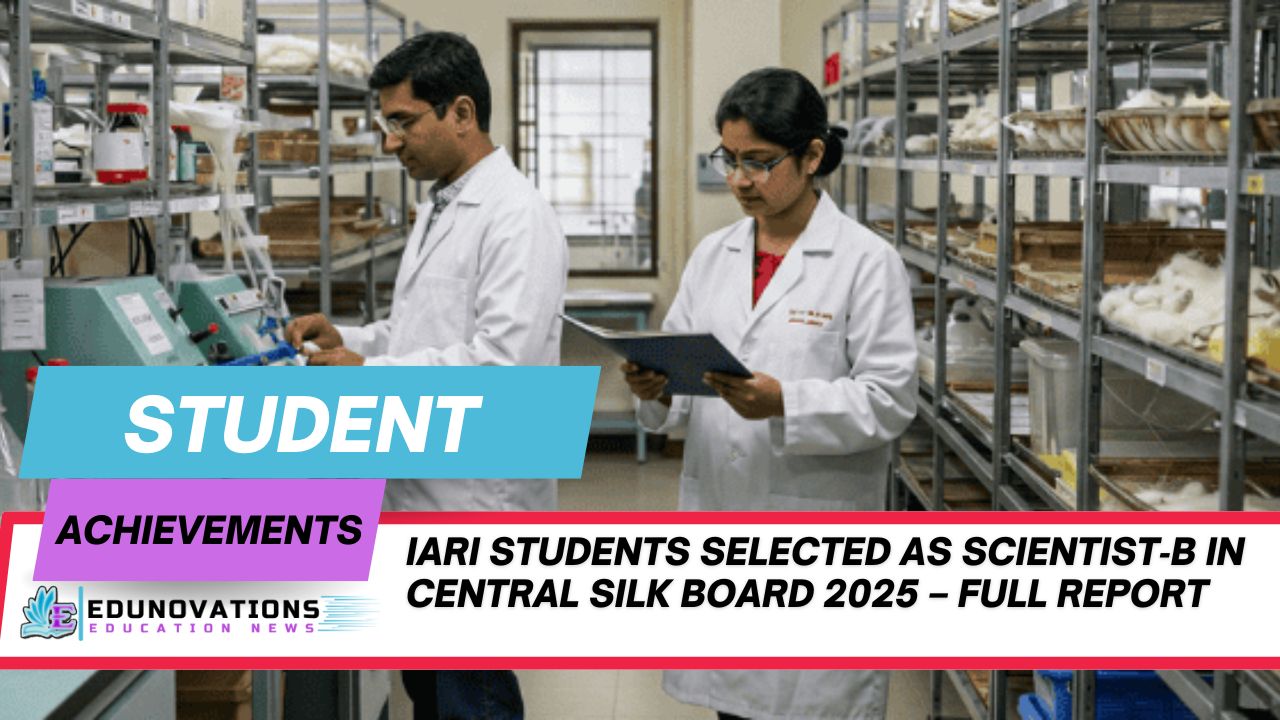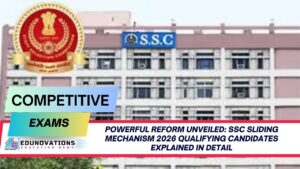Discover how IARI students selected as Scientist‑B in Central Silk Board 2025. Full list, expert insights, and success analysis inside.
IARI Students Shine Bright in Central Silk Board Scientist-B Selections 2025
In a remarkable display of academic excellence and scientific acumen, IARI students selected as Scientist‑B in Central Silk Board 2025 have once again proven the institute’s leadership in agricultural and life sciences education. A total of 36 students from the Indian Agricultural Research Institute (IARI) were selected for the prestigious Scientist-B positions in the Central Silk Board, under the Ministry of Textiles, Government of India.
This milestone reflects not only the quality of education and training at IARI but also a continued national emphasis on promoting sericulture through strategic human resource development.
Understanding the Selections: Numbers, Categories, and Subjects
A detailed breakdown reveals the following:
- Total IARI students selected: 36
- Subject-wise distribution:
- Plant Genetic Resources: 9
- Soil Science: 6
- Genetics and Plant Breeding: 5
- Entomology: 5
- Biochemistry: 4
- Plant Physiology: 3
- Agricultural Microbiology: 2
- Nematology & Seed Science & Tech: 1 each
These selections were based on all-India level recruitment conducted by the Central Silk Board (CSB) in 2025 to meet growing R&D and field demands in India’s expanding sericulture sector.
Toppers Use Mind Maps to score more than 95%
NCERT Class 11th Commerce Mind Maps
Add to cartOriginal price was: ₹999.00.₹199.00Current price is: ₹199.00.NCERT Class 12th Chemistry Mind Maps
Add to cartOriginal price was: ₹199.00.₹75.00Current price is: ₹75.00.NCERT Class 12th Commerce Mind Maps
Add to cartOriginal price was: ₹999.00.₹199.00Current price is: ₹199.00.NCERT Class 12th Science Mind Maps
Add to cartOriginal price was: ₹999.00.₹199.00Current price is: ₹199.00.NCERT Mind Maps For Class 10th
Add to cartOriginal price was: ₹999.00.₹199.00Current price is: ₹199.00.
Purchase Today
IARI’s National Footprint: Diverse Campus Contributions
The selections span multiple IARI campuses, indicating a robust and uniform academic standard across locations. Selections came from:
- IARI Delhi – Leading with the highest selections
- IARI Assam and Jharkhand campuses – Contributing significantly
This IARI Delhi Assam Jharkhand campuses success Silk Board selections showcases a decentralization of excellence and further strengthens the regional research infrastructure.
Driving Forces Behind the Success
Experts attribute this stellar performance to a confluence of academic rigor and visionary guidance provided at IARI. According to Dr. J.P. Sharma, Vice Chancellor of BAU Ranchi and former Director of IARI:
“This accomplishment underscores the institute’s commitment to developing scientists equipped to serve national priorities in sericulture and agriculture.”
IARI’s curriculum blends fundamental science with industry-aligned practical skills. Their strong mentorship culture, research-intensive ecosystem, and frequent exposure to competitive recruitment formats gave the students a clear edge.
Relevance of Scientist-B Roles in Sericulture Development
The Central Silk Board Scientist B results 2025 soil science genetics offer more than just employment opportunities; they provide critical manpower to India’s growing silk production sector. Scientist-B roles are essential in:
- Crop improvement and silkworm breeding
- Soil health analysis for mulberry cultivation
- Genetic characterization of silk-producing species
- Sustainable pest and disease management
With India being the second-largest silk producer globally, the importance of building a technically qualified workforce cannot be overstated.
Spotlight on Key Disciplines: Why They Matter
Here’s a closer look at some subject areas with high selections:
Plant Genetic Resources
This domain leads the selection tally. With 9 IARI students clearing the exam in this category, it reflects the strategic role genetic conservation and diversity play in boosting sericulture resilience.
Soil Science
A foundational aspect for optimal mulberry growth, the Central Silk Board Scientist B results 2025 soil science genetics stress soil microbiome health, pH balance, and nutrient cycles – all pivotal for silkworm rearing.
Genetics and Plant Breeding
In an era of climate change and disease emergence, developing high-yielding and pest-resistant mulberry strains becomes vital – explaining why 5 students qualified under this discipline.
Institutional Ecosystem Supporting the Success
IARI’s ecosystem includes:
- Advanced labs and molecular tools
- Interdisciplinary faculty and mentorship
- Frequent competitive exam simulations
- Linkages with government bodies like ICAR, DBT, CSB
For aspirants interested in preparing for such opportunities, visit Current Affairs and MCQ Practice to stay updated and sharp. You can also explore NCERT Notes and Mind Maps tailored for competitive exams.
Role of Regional Outreach and Equal Opportunity
The IARI Delhi Assam Jharkhand campuses success Silk Board selections narrative emphasizes equal opportunity. Students from regional campuses such as Assam and Jharkhand competing at par with Delhi candidates demonstrates the inclusivity of India’s agricultural research institutions.
Broader Implications: Education and Policy
These results may influence future policies in higher agricultural education and rural employment. The Ministry of Textiles and Ministry of Agriculture may collaborate more to strengthen the research-practice link in sericulture and allied sectors.
For those seeking structured learning paths in related fields, you can explore curated NCERT Courses or download free NCERT PDFs.
Expert Voices on the Milestone
Dr. Ramesh Chand, Member, NITI Aayog (Agriculture), praised the selections:
“This validates our investment in institutions like IARI. The role of science in rural transformation, particularly through value chains like silk, is crucial for Atmanirbhar Bharat.”
The Road Ahead for Selected Candidates
New Scientist-Bs will now serve in various CSB research institutes and field stations, contributing to national missions in sericulture. Their responsibilities will span:
- Innovative breeding programs
- Sustainable pest and disease management
- Climate-resilient cultivation techniques
- Quality assurance of silkworm eggs and mulberry saplings
Resources for Aspiring Candidates
If you’re aiming for a career like these successful IARI students, these resources can accelerate your preparation:
FAQs
- How many IARI students selected as Scientist‑B in Central Silk Board 2025?
36 students across multiple IARI campuses were selected. - Which disciplines saw the highest number of IARI selections in Silk Board results?
Plant Genetic Resources, Soil Science, and Genetics. - What is the significance of these Scientist‑B positions in CSB?
They are critical for advancing R&D in sericulture. - Did students from regional campuses like Assam and Jharkhand get selected?
Yes, several selections were from IARI Assam and Jharkhand. - How can students prepare for Central Silk Board Scientist-B recruitment?
By studying NCERT material, following current affairs, and practicing MCQs. - What subjects were included in the Scientist-B recruitment?
Plant Genetic Resources, Entomology, Soil Science, Microbiology, etc. - Is this selection result for Central Silk Board 2025 official?
Yes, it was officially released on July 21, 2025. - Where can I find preparation materials for CSB and other exams?
Visit Edunovations Resources for full access. - Why is soil science important in sericulture research?
Mulberry, the silkworm’s food, thrives in well-maintained soil environments. - Will these Scientist‑B selections help boost India’s silk output?
Yes, the enhanced technical manpower is expected to increase productivity and innovation.














